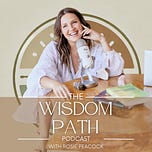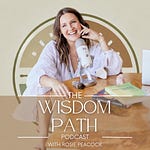There is a shift happening—a quiet yet powerful revolution in the way we hold space, share wisdom, and guide others. The old guru model, where a single leader is positioned as the all-knowing authority, is falling away.
And honestly? It’s about time.
For too long, coaching, wisdom-keeping, and leadership spaces have been built on the illusion that one person holds all the answers—that if we simply follow their formula, adopt their mindset, or subscribe to their framework, we will find the clarity, success, or transformation we seek. But this model is deeply flawed—for both the teacher and the student.
Because true wisdom cannot be handed to you. It must be uncovered, remembered, and embodied.
The Illusion of the Guru Model
When I first entered the coaching industry, everything was about expert positioning. To get clients, I was told to:
• Niche down
• Define a clear problem and solution
• Position myself as the go-to authority in my field
And for a time, I followed this advice. It worked. But something about it felt deeply out of alignment.
I had spent years studying coaching psychology, a discipline rooted in the idea that the client already holds the answers within them. Yet, in the coaching space I entered after completing my master’s, I saw this truth being diluted. Instead of guiding people towards their own wisdom, mentors were stepping in with answers, formulas, and the “right” way of doing things.
And it is easy to see why—certainty sells.
The guru model is appealing because it offers people a sense of safety. It provides a clear solution and a fixed path, which can feel reassuring.
But this comes at a cost: self-sovereignty.
In this dynamic, the leader retains power, while the followers become dependent—waiting for the next programme, the next step, the next insight to tell them what to do. Instead of learning to trust themselves, they outsource their wisdom.
And that is exactly what needs to change.
The Shift: Decentralised Wisdom and Sovereign Leadership
What we are seeing now is a return to sovereignty—a movement away from top-down leadership and towards shared wisdom, co-creation, and deep self-trust.
In this new paradigm:
• Leaders are no longer “experts”—they are guides, facilitators, and space-holders
• Wisdom is collective, not individual—it is something we build together, not something a single person holds
• Embodiment matters more than authority—people no longer follow those who simply have the right branding, they follow those who are living their truth
This shift is powerful. But it also requires a new way of leading.
How to Embody the New Paradigm of Leadership
If you are a coach, healer, facilitator, or wisdom keeper, this is your invitation to step into a new kind of leadership—one that does not rely on rigid frameworks, power dynamics, or positioning yourself as the ultimate authority.
1. Guide Through Questions, Not Answers
The most powerful thing you can do for someone is help them uncover their own truth.
Instead of telling people what to think or do, ask better questions:
• What do you already know deep down?
• Where is your body guiding you?
• What feels true for you, beyond external influence?
When people arrive at their own answers, those answers resonate on a soul level.
2. Foster Self-Sovereignty, Not Dependence
The old paradigm of coaching thrived on keeping clients coming back. But true leadership is not about creating dependence—it is about empowering others to trust themselves.
If your work leaves people feeling more connected to their own wisdom, more capable of making aligned decisions, and less reliant on external validation, you are leading in the new way.
3. Embody Your Teachings Instead of Preaching Them
In a world of online personas, what matters most is who you are when no one is watching.
Do your teachings hold up when people meet you in real life? Are you living in alignment with what you teach?
• The future of wisdom-keeping is embodied
• Leadership is who you are, not what you sell
• Integrity is the new authority
4. Decentralise Leadership and Co-Create Wisdom
This shift is not just about how we lead—it is about how we structure our spaces.
Moving away from the guru model means embracing more collaborative, non-hierarchical ways of working:
• Community-led learning spaces over rigid programmes
• Ceremonial circles where everyone is invited to bring their wisdom
• Peer mentorship and co-creation instead of top-down teaching
This is how wisdom has always been shared—through conversation, storytelling, and collective experience.
The Future of Wisdom Work
The guru model is fading. And in its place, a new kind of leadership is emerging—one that is rooted in self-trust, authenticity, and shared wisdom.
Perhaps this model is not as easy to sell. Perhaps it does not fit neatly into the marketing formulas we have been given.
But it is what the world needs.
Because when we stop giving people answers and instead help them turn inward, we awaken something far more powerful:
• Their own wisdom
• Their own sovereignty
• Their own path
And that is the kind of leadership that changes everything.
Reflection Questions
In order to truly embody the shift away from the guru model, I do not want this to be a space where I simply speak at you. Wisdom is not something that can be handed down from one person to another—it must be discovered, remembered, and embodied through your own lived experience. My role here is not to provide you with absolute answers, but rather to offer perspectives, spark inquiry, and hold space for your own unfolding.
So rather than ending this with a neat conclusion that tells you what to take away, I am inviting you to turn inward. Below are some reflective questions to help you explore these ideas in your own life and leadership. Take them into your journaling practice, your meditation, or simply let them sit with you. Use them as a guide—not to find the “right” answer, but to deepen your connection to your own wisdom.
• Are you embodying what you teach, or do you feel pressure to be an “expert”?
• How do you encourage sovereignty and self-trust in those you guide, support or facilitate?
• Are there areas where you can step deeper into embodied leadership?
Let’s continue this conversation. Comment below, share your thoughts, or join the community of wisdom keepers creating a new path forward.
With love and reverence,
Rosie 🦚












